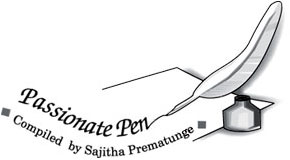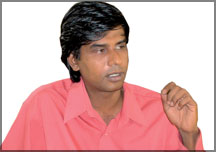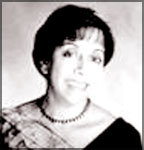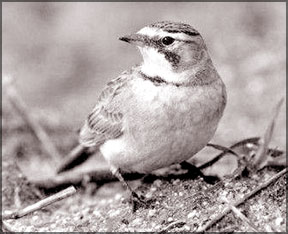My poetry is all about love - Malinda Seneviratne
By Ranga Chandraratne
[email protected]
 Q:
Compared with your earlier works which are about turbulent student
life in the pictorial Universityof Peradeniya and your numerous love
affairs, your recent poetry is almost philosophical. In some of the
poetry that you submitted for the Gratiaen and in your unpublished “Book
of Answers” you look at ‘love’ from an entirely different perspective.
Please comment. Q:
Compared with your earlier works which are about turbulent student
life in the pictorial Universityof Peradeniya and your numerous love
affairs, your recent poetry is almost philosophical. In some of the
poetry that you submitted for the Gratiaen and in your unpublished “Book
of Answers” you look at ‘love’ from an entirely different perspective.
Please comment.
A: We do not live in the same landscape always. We move to
different social, geographical and emotional locations. So what we see,
feel and experience in those different places makes us write different
things.
This does not mean there is less romance in my life now or that I am
less committed to social issues. These things have acquired different
colours, that’s all. Maybe I have matured or maybe I have become more
innocent.
Back then I was a typical young man, drunk on the notion of
everlasting love. I see love and relationships differently now. I do not
entertain the notion of being madly in love forever. It is possible to
be deeply in love, but that is something that has less to do with
romance than with understanding, patience, respect and sometimes very
material things like family and children.
‘Madly in love’ on the other hand, is brief; it is but for one
splendid moment. Philosophical? No. I am a just a describer of things,
that’s all.

“When we wear the clothes that is demanded of us, do we stuff our
unhappy skins in a trash can or turn them into drums beaten to
unfamiliar rhythms?”Society demands individuals to fit into roles that
sometimes don’t fit them, that are painful to them. Yet, individuals are
hapless given the constraints imposed on them. Is this all about the
plight of the modern man?
This has always been the case. Marx said men make history but in the
circumstance of their choice. Pierrre Bourdieu talks of structuring
structures and structured structures. So there is structure and agency
both. Society does inform but we are not helpless recipients of
structural dictates.
We can shape things and it is a choice that we have to make. I do not
think everyone is powerless. I think everyone has agency. We do not live
in ideal circumstances but I am optimistic that I can help change
things. I have no illusions about my ability but I am not going to stop
me from trying.
I wear the clothes that I like to wear and that I feel comfortable
in; but this does not mean I can come naked to office even if I like
that. So there is give and take. I just try to expand the horizons of my
mobility.
I cannot tell my heart all this, for I too am an unbeliever, I refuse
to accept that the heart that gives the world its colour has chosen to
die for me.
Q: In “Impasse”, what do you try to depict? Is it the passing
away of a loved one or an eternal struggle between ‘heart’ and ‘mind’
and a bold declaration that ‘the heart that gives the world its colour’
has breathed its last?
A: There are frames of logic that we reference. One is reason
and it is mind-born; the other is feeling and that is heart-born. Over
time I have come to trust the logic of the heart more that the logic of
the mind. You cannot draw a hard line and beyond this is mind and this
side is heart, but if I am forced to choose, I will pick the heart any
day.
“If you are love, then let me be its tear drop and smile.” The
passionate and rather poignant poem “You and I again” depicts the bliss
of re-union of loved ones. However, here it is clear that ‘reunion’ has
not taken place and the poet’s agonizing pain is expressed in no
uncertain terms and in a way, is a submission of ‘soul’ to the bliss of
deprived love. Please comment.
Everlasting love is untenable. Love can be destroyed by the slightest
thing, a wrong word, not being at the right place at the right time and
at the wrong place at the wrong time. There are human frailties. So
love, relationships...they are scripted to end. But this doesn’t not
mean we should not love or seek or desire that moment of magic.
Love is about two people becoming one, two entities ‘I’ and ‘you’
becoming ‘us’ for a moment. I have reconciled myself to both that beauty
and the pain that has to follow. That is the part of the equation. You
cannot define love but you can recognise it by the unbearable sorrow
that it produces and the inexpressible joy that it gives.
People sometimes think it is one or the other. If something causes so
much pain can it be love, we wonder. Or we think it must be love because
it gives so much joy. It doest not work like that.
We all know that. From the beginning of history, people who have
loved know this. How can something be at the same moment a knife and a
balm? The logic of the mind does not allow that. The mind cannot explain
but the logic of the heart understands.
Q: In the poem “Preamble to the narrative of Illusion “, you
deal with ‘illusive’ element in love.
A: “... yes, in the name of love.
You did not arrive and neither did you keep away,
you arrived not as yourself,
but as your illusion.
And faint recollection
that relic of the pera esura,”.
Q: Is it your interpretation of love? Or is it a grotesque
description or a ‘narrative of illusion’?
A: We have only loved one person. All of us. It has to be one.
Everything that came before cannot be love. If what came before was
‘love’, then that last person cannot exist. We look for the perfect love
and we find its approximation. It does not last. Sometimes we never
recover.
Sometimes it takes years for a name to be replaced by another. The
‘love’ I felt twenty years ago, when I look back on that moment now,
seems mis-named. But at that time it was my world. Whatever came before
was an illusion. That which I experience now, tomorrow will be an
illusion.
The most perfect woman or the most perfect relationship is something
we look forward to. We see something and based on our understanding of
love, relationships and human condition, we name it ‘perfection’.
Tomorrow it won’t be that. It will be something else. But this moment I
will embrace it and it will not be an illusion. It is real.
Q: “REQUIEM (For Parami Kulatunga)” is perhaps, a fitting
tribute to a battle-hardened soldier who left his footprint on the
quicksand of a long-drawn conflict. I suppose you wanted to explore the
hitherto unexplored territory in the life of late Major General Parami
Kulatunga. Your comments please.
A: I have never seen him. Parami Kulatunga was a general but
this poem is not just about Parami or about generals. It is also about
the soldier at the Pamankade checkpoint. Everyday he checks hundred of
vehicles, and one of them might explode in their faces any moment.
They know this. Their lives are different. How can we even comprehend
what their realities are? The person who slept next to them last night,
tomorrow might not be alive. How easy it is to say that they are
mindless people blindly following orders.
They have hearts and they have families. This poem addresses these
concerns. Can we let such a man die? Anyone who has, as part of his
vocation, resolved himself to the fact of sudden and violent death any
moment is a hero to me. I cannot let that person die not in a
metaphorical sense. They have to be made to be alive.
Q: “And so I go”is also valediction or a parting poem
dedicated to a loved one. Love has been a recurrent theme in your
poetry. Any special reason?
A: Yes, it is a recurrent theme. There were two things that
inspired me; love and social justice. Now I think even social justice is
about love. I like to be passionate with things that I do whether it is
demonstration or any kind of political activity or in a political
commentary, I sit down and write it because I am passionate about it.
This does not mean that there is no employment of intellect in what I
write outside of poetry. In all these things, there is love; love for
the country, love for the way of life in this country. There is love for
what we have been given by our ancestors.
This does not mean that we are or will be living in paradise; but by
and large I did not and do not want to live anywhere else. So love is
naturally a recurrent theme. It is the only theme for me when I write
whether it is poetry or anything.
Q: In “Ode to Telephones” you have tried to define the
broadest possible perception of communication and you state that
“communication is about context,” and that it is not confined to an
exchange of words. Your comments please.
A: Yes, you need words for telephone conversation. When there
is physical proximity, there are many other channels of communication
that are immediately opened. You can say something in ten thousands
words and you can say nothing and express something more profound; in
the way you look down, the way look away, the way you smile, the way you
touch.
Q: In “Questions for Leonard Woolf”, you have tried to
redefine the literary figure that left indelible marks on the Sri Lankan
literary landscape. How do you perceive Leonard Woolf as a literary
figure and a colonial master with a heart?
A: This was a poem I wrote for a feature on Leonard Woolf. It
happens like this. At ‘The Nation’ newspaper we used to do a two-page
centre spread on some topic and I would tell the lay-out person to leave
some space for me to write something. When he has placed all the copy
and illustrations, he calls me. I sit down on the computer and write a
poem which goes with the rest of the material. These are not carefully
crafted things; they are dictated by deadlines and attending copy.
About Leonard Woolf and the matter of him being essentially a
colonial master, I do not think people are one dimensional. Sometimes
you get dimensions that you can’t suffer. And sometimes certain things
are forgivable. Leonard Woolf or Malinda will bring his own baggage into
writing; our biases, prejudices and this becomes evident in what we
write, however much we might want to disguise it.
We find this in most accounts; in the form of literature or
sociological writing or historiography. I read the book thirty years ago
and who I was thirty years ago is not who I am now. I tend to be kinder
than I used to be. People are really mixed-bags. I find people
insufferable for a lot of things.
A good example would be Rama Mani. She is a fraud politically, but
that does not mean that I think she cannot understand or appreciate
literature. Or take Sumathy Sivamohan. An extremely articulate and
clever person. She understands the rhythms and music of wards.
Her politics, in my book, is utter crap. I can appreciate her at one
level but this does not mean that I will give her a blank cheque. I do
not give blank cheques to anyone. By the same token I do not trash
people out of hand. Prabhakaran is a mindless terrorist but we have to
appreciate the fact that he has an incredibly astute military mind.
Woolf is problematic, yes. Not reason enough to toss him into the
garbage dump though.
Q: “My Disabilities” is, I would say, one of the most
effective ways of conveying the ‘mind-forged manacles’ and ‘conditioning
of the human being ‘ in a modern society. Your comments please.
A: This was also for a feature on World Day of the Disabled.
It occurred to me that we who are not labeled disabled also have certain
handicaps, certain disabilities. Some of which are our own creation and
some of which are conditioned by society. We see certain injustices and
ignore others.
In that poem I refer to all the senses; things we hear and things we
chose not to hear; the moments when we stand up to speak and the moments
where we chose to be silent.
There is a certain not-doing in that; being passive. Those are all
disabilities. It is not about not having a hand, not having a leg and
not being able to see. So that poem essentially is self-reflective and
questions what right we have to be condescending or generous to people
who have been labeled thus.
************
Malinda on the Gratiaen Prize and Sri Lankan Literature in English
One submits certain manuscripts for assessment; one has to live with
the assessment. I didn’t win the Gratiaen Award. Is there
disappointment? Yes, who after all does not want to win? But then again
I am not a poet. I don’t teach literature, I don’t move around in
literary circles. I don’t do literature. I do other things. So yes, it
would have been nice had I won but I am ok with the fact that I didn’t.
I have no quarrel with the judges or the winner on account of that
decision.
That night, however, I was accused by the Gratiaen Trust of indulging
in incest. This was over a review I wrote. I had thought that the
evening was to be about the celebration of literature, of sensibility
and sensitivity. What happened was positively crude and not in keeping
with the spirit of the Gratiaen. The Gratiaen Trust passed judgment on
me. As always, it simultaneously passed judgment on itself. I don’t
think I ended up looking small-minded or a literary-pretender.
There was also some comfort, however, in what the chairman of the
panel of judges had to say. He said that perhaps the Trust should
consider getting down a foreign judge who would be, one surmises, immune
from the petty and yes, incestuous, politics of the English literary
scene in Sri Lanka.
Yasmine Gooneratne Creations with a homely touch
 Novelist,
poet and critic, Yasmine Gooneratne, a past pupil of Bishop’s College,
went on to graduate from the University of Ceylon in 1959, and received
her PhD in English Literature from Cambridge University in 1962. Yasmine
became a resident of Australia in 1972. Novelist,
poet and critic, Yasmine Gooneratne, a past pupil of Bishop’s College,
went on to graduate from the University of Ceylon in 1959, and received
her PhD in English Literature from Cambridge University in 1962. Yasmine
became a resident of Australia in 1972.
In 1981 she was the first, and remains until now, the only person to
receive the higher doctoral degree of Doctor of Letters ever awarded by
Macquarie University. She now holds a personal chair in English
Literature at Macquarie University, New South Wales.

From 1989-1993 she was the Foundation Director of the Universities
Post-Colonial Literatures and Language Research centre. In 1990
Gooneratne became an Officer of the Order of Australia for her
distinguished service to literature and education.
Yasmine is married to Dr. Brendon Gooneratne, a physician,
environmentalist and historian. They married in 1962 and have two
children, a son and a daughter who currently live in Sydney, Australia.
Gooneratne has published sixteen books. She has written volumes of
literary essays as well as a poems, short stories, a family memoir and
two novels.
In 1991, she was awarded a Writer’s Fellowship at Varan Writer’s
Centre where she edited the final draft of one of her novels, A Change
of Skies. This novel later won the Marjorie Barnard Literary award for
fiction in 1992 and shortlisted for the 1991 Commonwealth writers prize.
Her second novel, Pleasures of Conquest, was shortlisted for the 1996
Commonwealth Writer’s prize.
She has also contributed various articles, poetry, short stories, and
other writings to many different anthologies and journals. Many of her
works have been presented on television, radio and at public readings
around Australia and many other parts of the world.
Gooneratne encompasses various themes in her writing. One theme that
continually appears in her works is reflection upon how the past affects
the future.
She relays many of her points more personal memoir that is based on
interviews with her family members and on her own memories of her
family’s life. She takes her family’s post and ties in how her wellknown
family has affected Sri Lankan’s history.
A Change of Skies, which deals with a Sri Lankan family moving to
Australia, focuses on the experiences of Asian immigrants and how they
adjust to living in the new environment of Australia.
Changes in history are also themes of her works. Gooneratne’s second
novel, The Pleasures of Conquest, deals with relationships between
Europe and Asia as Ceylon undergoes a transformation from a British
Colony to an independent Sri Lanka. Her poetry also has many different
themes. One major theme of her poetry is poetry itself. She refers to
different parts of poetry, like verses and lives, in many of her poems.
she makes the words seem powerful and alive.
Compiled by Ishara Mudugamuwa
[email protected]

Domination

My girl asked
What do you want?
A drop of blood
Your purity
Why do you want it?
To show it to tradition
Who'll require it?
My mother
(After few months….)
I asked from her
What is the specialty of today?
Today's the women's day
Why do you seem to be in disgust?
No. I'm thinking of male domination.
There are lots of crimes
Done by males
Is that so?
What about women
Like my mother
(Silence……………….)
Chameera Lasantha
The Lark
The chirp of yours in the midsummer
Fills my heart with joy
The chirp of yours in the spring
Calls me to be gay
The autumn chirp of yours
Astonishes my feelings
The chirping in winter
How quaint it is
The chirp of a lark is an age old magic
Deep in the woods
I hear your vexed chirp
How queer it is
At dawn it's refreshing
At dusk it's a cry of sorrow
But it is you indeed THE LARK.
Tharindu Jayamanna
|
